沪教牛津版英语五年级下册 Module 3 知识清单
上海牛津版五年级下册英语5B M3U3优质同步讲义
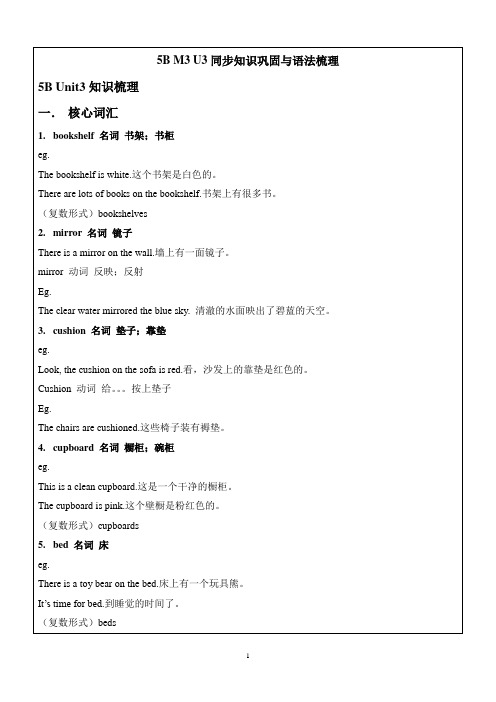
Please sit on the sofa.请坐在沙发上。
There is a white cat on the sofa.沙发上有一只白色的猫。
(复数形式)sofas
8.furniture名词家具
eg.
Let’s move thefurnitureon Sunday.让我们周日把家具移动一下吧。
Yes, there is.是的,有。
Were there any apples in the basket?篮子里有一些苹果吗?
No, there weren’t.不,没有。
2.The sofa was under the shelf. Now it’s under the window.沙发原来在架子的下面。现在它在窗户底下。
Eg.
Where were your clothes?你的衣服原来在哪里?
They were in my cupboard. Now, they are on my bed.
它们原来在我的衣柜里。现在,它们在床上。
四.语法
1.Let’s move thefurniture.
Let’s表示说话人向对方提出建议。这是由“let”带头的祈使句,通常表示建议,命令,请求或允许等。本句含有建议之意。其否定形式通常是在let’s或let us/me后加not.
I ________ ________ English
5. I do my homework in the classroom.(用at home作选择疑问句)
________ you do your homework in the classroom ________ at home?
6. The robot is big. It’s nice (合并成一句)
沪教牛津五下 Module 3 知识清单
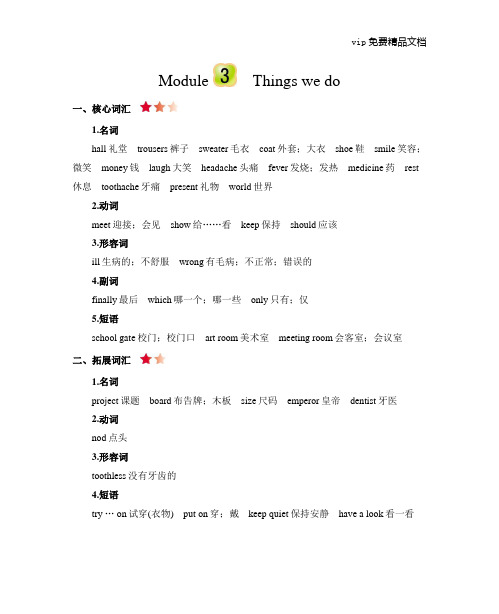
Module Things we do一、核心词汇1.名词hall礼堂trousers裤子sweater毛衣coat外套;大衣shoe鞋smile笑容;微笑money钱laugh大笑headache头痛fever发烧;发热medicine药rest 休息toothache牙痛present礼物world世界2.动词meet迎接;会见show给……看keep保持should应该3.形容词ill生病的;不舒服wrong有毛病;不正常;错误的4.副词finally最后which哪一个;哪一些only只有;仅5.短语school gate校门;校门口art room美术室meeting room会客室;会议室二、拓展词汇1.名词project课题board布告牌;木板size尺码emperor皇帝dentist牙医2.动词nod点头3.形容词toothless没有牙齿的4.短语try … on试穿(衣物)put on穿;戴keep quiet保持安静have a look看一看have a headache头疼have a fever发烧have a cold感冒have a rest休息一下get well康复have a toothache牙疼have a meeting开会pull… out把……拔出三、核心句型1.First, they’ll visit our classroom. 首先,他们将参观我们的教室解读: 这是一个一般将来时的句型, first意思是“首先”,常用于叙述事情发展的开端visit意思是“参观”举一反三: First, I clean the living room. Then I clean my bedroom. 首先,我打扫客厅然后我打扫我的卧室First, you should finish your homework. Next, you should wash your clothes. Then you can go out to play. 首先你应该完成你的家庭作业紧接着,你应该洗你的衣服然后你可以出去玩儿2.Which dress do you like, the blue one or the pink one?你喜欢哪件连衣裙,蓝色的那件还是粉色的那件?解读: 这是一个选择疑问句; which是特殊疑问词,后面跟名词, or意思是“或者”,答句一般选择其一作答举一反三: Which cap do you like, the blue one or the brown one?你喜欢哪顶帽子,蓝色的还是棕色的?Which teacher do you like, Miss Li or Mr Lu?你喜欢哪位老师,李老师还是陆老师?3.You should take some medicine. 你应该吃些药解读: 这是一个含有情态动词should的陈述句, should意思是“应该”,是情态动词,后面跟动词原形,没有人称和数的变化take本意是“带走;拿走”,在此处意思是“吃”; medicine是不可数名词举一反三: We should keep quiet in the classroom. 我们在教室里应该保持安静They should come here early. 他们应该早点儿来这里4.You shouldn’t go to bed late. 你不应该很晚上床睡觉解读: 这是一个否定句, shouldn’t是should not 的缩略形式,意思是“不应该”,后面跟动词原形go to bed是固定短语,意思是“上床睡觉”, late是副词,修饰动词作状语举一反三: You shouldn’t go out to play. It’s cold outside. 你不应该去外面玩外面很冷You shouldn’t go to school by bike. Because there are lots of cars and buses on the road. It’s very dangerous. 你不应该骑自行车去上学因为在公路上有很多的汽车和公共汽车那样很危险5.What’s wrong with you?你哪里不舒服?解读: 这是一个特殊疑问句what是特殊疑问词, wrong意思是“有毛病;不正常;错误的”,with是介词,意思是“和……在一起”,后边跟人称代词宾格形式或某个人举一反三: — What’s wrong with Tom? 汤姆哪里不舒服?— He has a cold. 他感冒了— What’s wrong with Jack? 杰克哪里不舒服?— He falls down. He hurts his leg. He feels sad. 他跌倒了他摔伤了腿他很难过四、拓展句型1.That’s right. 正确解读: 这是一个简单的肯定句常用于对他人说的话表示肯定2.After that, they’ll go to the library. 之后,他们将去图书馆解读: 这是一个接上文继续陈述某件事情的发展经过的句型, that代指上文提到的事情, after that是指“(在那件事情)之后”,此句是一般将来时态的句子, will加动词原形,表示将要做某事,没有人称和数的变化3.You can try both on. 你可以试穿这两件解读: 这是一个陈述句情态动词can加动词原形,一起构成谓语, both意思是“两者都”, try … on是固定短语,意思是“试穿(衣物)”4.Here you are. 给你解读: 这是一个不完全倒装句以here, there开头的句子,如果主语是名词,其谓语动词要放到主语之前,即: Here/There + 谓语动词 + 主语(名词)5.I like the brown one. 我喜欢棕色的那件解读: 这是一个陈述句, one在这里是代指上文提到过的某人或某物如果上文提到的是复数,则用ones来代指6.Which pair of trousers does Ben like? 本喜欢哪条裤子?解读: 这是一个特殊疑问句, which后面跟名词pair是“成双成对”的意思, a pair of意思是“一双/条/副……”如: a pair of socks一双袜子 a pair of gloves一副手套7.There is an emperor. 有一个皇帝解读: 这是there be结构的句型,系动词be遵循就近原则如果主语是单数,则用there is,如果主语是复数,则用there are an表示一个,用在以元音音素开头的名词前面如: an egg一个鸡蛋 an apple一个苹果。
五年级下册英语素材第三单元知识点复习沪教牛津版

五年级下册英语素材第三单元知识点复习沪教牛津版“师”之概念,大体是从先秦时期的“师长、师傅、先生”而来。
其中“师傅”更早则意指春秋时国君的老师。
《说文解字》中有注曰:“师教人以道者之称也”。
“师”之含义,现在泛指从事教育工作或是传授知识技术也或是某方面有特长值得学习者。
“老师”的原意并非由“老”而形容“师”。
“老”在旧语义中也是一种尊称,隐喻年长且学识渊博者。
“老”“师”连用最初见于《史记》,有“荀卿最为老师”之说法。
慢慢“老师”之说也不再有年龄的限制,老少皆可适用。
只是司马迁笔下的“老师”因此不是今日意义上的“教师”,其只是“老”和“师”的复合构词,所表达的含义多指对知识渊博者的一种尊称,虽能从其身上学以“道”,但其不一定是知识的传播者。
今天看来,“教师”的必要条件不光是拥有知识,更重于传播知识。
单靠“死”记还不行,还得“活”用,姑且称之为“先死后活”吧。
让学生把一周看到或听到的新奇事记下来,摒弃那些假话套话空话,写出自己的真情实感,篇幅可长可短,并要求运用积存的成语、名言警句等,定期检查点评,选择优秀篇目在班里朗读或展出。
如此,即巩固了所学的材料,又锤炼了学生的写作能力,同时还培养了学生的观看能力、思维能力等等,达到“一石多鸟”的成效。
Unit 3 In the future【词组】in the future 在今后know about 明白关于in front of ……在……前面(外部)in the front of ……在……前面(内部)4.a magic machine 一个奇异的机器5.take a photo = take photos 拍照take a picture = take pictures 拍照6.look at 看着7.on the back 在背面8. wear glasses 戴眼镜9.live in Beijing 住在北京10.(am/is/are)good at + 名词 / 动词ing = do well in + 名词 / 动词ing 擅长做某事(am/is/are) weak in + 名词 / 动词ing 不擅长做某事11.like to + 动词原形 = like + 动词ing 喜爱做某事12. get up early 早起 get up l ate 晚起13. have no time for + 名词 / 动词 ing 没时刻做某事14.(am/is/are) late for 迟到(am/is/are)late for school 上学迟到15.get tired 疲乏;累了;变的疲劳;感受疲乏16.study hard 努力学习17.read more English books 读更多的书18.try to + 动词原形尝试去做某事19.have breakfast 吃早餐 have lunch 吃午餐 have dinner 吃晚餐20. not……any more 不再21. do exercise = play sport 做运动22. every day 每天23.watch too much TV 看太多电视24.now and future 现在和以后【句型】1.Kitty wants to know about her future. Kitty想明白她的以后。
沪教牛津版深圳用英语五年级下册Module 3 Things we do Revision 3课件
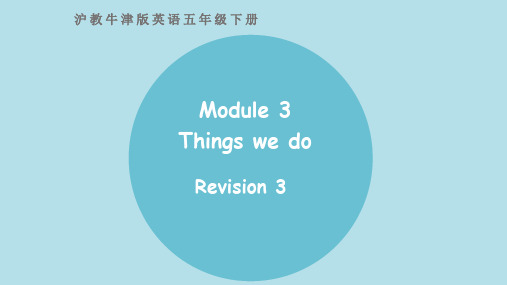
2. 学习了下列短语: try…on, put…on, keep quiet, have a look, have a rest, get well, pull…out, have a fever, have a cough, have a cold, have a headache, take some medicine.
— Thank you.
A. get angry
B. get well
C. get tired
2. ____A____ me have a look.
A. Let
B. Let’s
C. Lets
3. You should drink ____A____ water.
A. a lot of
B. a lot
沪教牛津版英语五年级下册
Module 3 Things we do
Revision 3
Review
第一课时
名词: hall project board money size
emperor trousers coat present world
shoe headache toothache fever medicine
Summary
1. 复习了下列单词: hall, project, board, money, size, emperor, trousers, coat, present, world, shoe, keep, headache, rest, toothache, fever, medicine, dentist, meet, laugh, smile, nod, show.
3. 学习了下列句型: (1)描述某人做某事先后顺序的句型 First…, Next…, Then Next…, Finally. (2)询问对方喜欢哪件物品的句型及回答 — Which (pair of)+名词+do you like, A+ or+ B? — I like A/B. (3)询问某人哪里不舒服的句型 What’s wrong with+某人?
精选2019-2020年新版-牛津上海版小学英语五年级下册Module 3 Things we doUnit 9 Seeing the doctor知识点

精选2019-2020年新版-牛津上海版小学英语五年级下册Module 3 Things we doUnit 9 Seeing the doctor知识点练习六十九第1题【单选题】( )I have a toothache.What should I do?A、You should go to see the dentist.B、You should not play with fire.C、You should drink a lot of water.【答案】:【解析】:第2题【单选题】—What"s wrong with you?—I .( )A、have a coldB、have a feverC、have a headache【答案】:【解析】:第3题【单选题】( )A、She has a coat.B、She has a cold.C、She has a candy.【答案】:【解析】:第4题【单选题】— What"s the today? — It"s the fifth of May. ( )A、dateB、dayC、time【答案】:【解析】:第5题【判断题】you"ll的完全形式是you will。
A、正确B、错误【解析】:第6题【书面表达】Mr Yang得了重感冒,你有什么建议?请至少写5句话。
Mr Yang has a cold.He should……【答案】:【解析】:第7题【语法填空】Kitty is not______(feel)well.【答案】:【解析】:第8题【语法填空】填上合适的介词。
You should drink a lot ______water.【答案】:第9题【语法填空】A clever fox______(have)a good idea.【答案】:【解析】:第10题【语法填空】Mrs Smith______(take)her son to the hospital.【答案】:【解析】:。
五年级下册牛津上海版英语m1u3课堂笔记
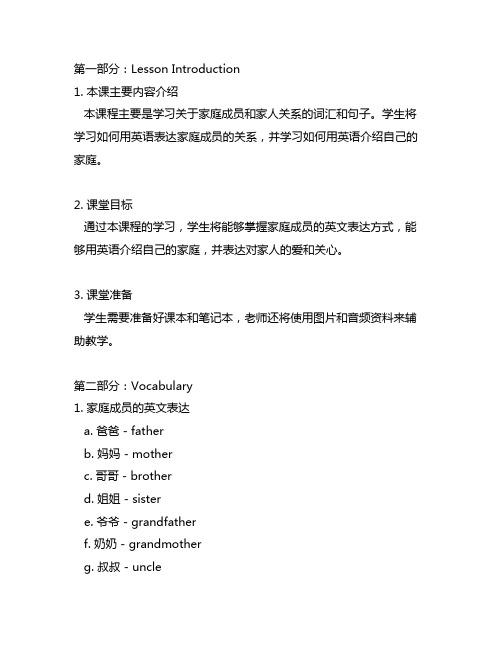
第一部分:Lesson Introduction1. 本课主要内容介绍本课程主要是学习关于家庭成员和家人关系的词汇和句子。
学生将学习如何用英语表达家庭成员的关系,并学习如何用英语介绍自己的家庭。
2. 课堂目标通过本课程的学习,学生将能够掌握家庭成员的英文表达方式,能够用英语介绍自己的家庭,并表达对家人的爱和关心。
3. 课堂准备学生需要准备好课本和笔记本,老师还将使用图片和音频资料来辅助教学。
第二部分:Vocabulary1. 家庭成员的英文表达a. 爸爸 - fatherb. 妈妈 - motherc. 哥哥 - brotherd. 姐姐 - sistere. 爷爷 - grandfatherf. 奶奶 - grandmotherg. 叔叔 - uncleh. 阿姨 - aunti. 弟弟 - younger brotherj. 妹妹 - younger sister2. 用英语介绍自己的家庭a. My name is [学生尊称]. I have a big family.b. This is my father. His name is [父亲尊称].c. This is my mother. Her name is [母亲尊称].d. I have a brother and a sister. Their names are [兄弟尊称] and [姐妹尊称].e. I love my family very much.第三部分:Language Points1. 人称代词a. 第一人称 - I(我)b. 第二人称 - you(你)c. 第三人称 - he(他)、she(她)、it(它)2. 动词 be 的形式a. am(I am)b. is(he is, she is, it is)c. are(you are, we are, they are)3. 形容词性物主代词a. my(我的)b. your(你的)c. his(他的)d. her(她的)e. its(它的)f. our(我们的)g. their(他们的)第四部分:Practice1. 完成练习册上的习题学生们将通过填空、选择和造句等形式来巩固所学的知识,加深对家庭成员和家人关系的理解。
完整word版牛津英语五年级下册知识点整理

牛津英语上海版五年级下册知识点整理Module1 Using my five sensesUnit1 What a mess生词:notebook paints crayon school bag tape glue brush音标:语法:Whose...? It's mine/yours/his/hers/ours/theirs. They're...Unit2 Watch it grow 生词:dogpuppy duck butterfly chick chicken duckling caterpillar语法:...was/were...Unit3 How noisy 生词:motorbike bus car drill lorry音标:?? ///??/ suretoy boy oy ure our enjoy joytour oor join oi noisepoor pointtoilet语法:...did...牛津英语上海版五年级下册知识点整理Module2 My favorite thingsUnit1 Food and drinks生词:Meat: pork beef chicken fishVegetables: tomatoes potatoes carrots cabbages beansFruit: apples oranges bananas grapesStaple Food: rice noodles breadDrinks: juice water milk tea语法:What did you have for...? I had...FilmUnit2生词:seat ticket ticket office entrance exit语法:Shall we...Unit3 school subject 生词:Music Maths Chinese English Art IT PE牛津英语上海版五年级下册知识点整理Module3 Things around usUnit1 Signs生词:telephone toilet restaurant exit entranceNo smoking No swimming Don't litter Don't walk on the grass音标:/r//l/ redl radio like late r grassblack grow blouse语法:What does this sign say/mean? It says/means wecan/can't/mustn't/shouldn't..Unit2 Weather 生词:rain/rainy wind/windy Cloud/cloudy sun/sunny ℃/thirty degrees 30snow/snowy storm/stormy fog/foggy音标:/e/ θ/ / these think th they ththird father mouth mother month语法:What's the weather like? What's the temperature?It's...(weather).It's...(temperature).Unit3 Changes 生词:sofa cushion bed mirror lamp bookshelf Cupboard语法:What can we do?牛津英语上海版五年级下册知识点整理Module4 More things to learnUnit1 Museum生词:Science museum art museum history museumInsect museum car museum railway museum语法:Which museum do you want to visit?I want to visit ...Why?Because...Unit2 Western holiday生词:Christmas Easter Halloween Thanksgiving 语法:When is ...? It's on ... What do people do on this holiday?Unit3 story time 生词:castle giant。
新沪教牛津版五年级下册小学英语全册单元知识点小结
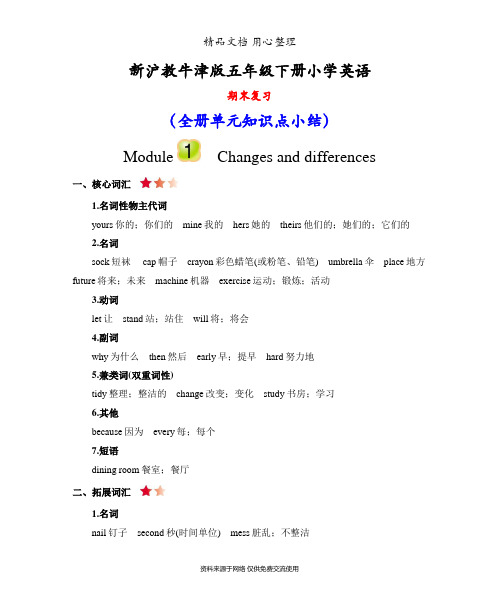
新沪教牛津版五年级下册小学英语期末复习(全册单元知识点小结)Module Changes and differences一、核心词汇1.名词性物主代词yours你的;你们的mine我的hers她的theirs他们的;她们的;它们的2.名词sock短袜 cap帽子crayon彩色蜡笔(或粉笔、铅笔)umbrella伞place地方future将来;未来machine机器exercise运动;锻炼;活动3.动词let让stand站;站住will将;将会4.副词why为什么then然后early早;提早hard努力地5.兼类词(双重词性)tidy整理;整洁的change改变;变化study书房;学习6.其他because因为every每;每个7.短语dining room餐室;餐厅二、拓展词汇1.名词nail钉子second秒(时间单位)mess脏乱;不整洁2.动词drop使落下;掉落stick粘贴;粘住3.形容词enough足够的more更多的4.副词twice两次easily容易地5.兼类词(双重词性)north北方;向北south南方;向南6.短语tidy up把……整理好(be) full of装满……;充满…… a few几个;一些wild goose大雁(复数wild geese) in the future将来in front of在……前面take a photo拍照wear glasses戴眼镜(be)weak in不擅长not … any more不再all day 一天到晚do exercise做运动三、核心句型1.— Are they yours?它们是你的?— No, they aren’t. 不,它们不是。
解读: 问句是一个一般疑问句,用来询问某物的归属,有肯定和否定两种回答。
举一反三: — Are these crayons yours?这些蜡笔是你的吗?— No, they aren’t. 不,它们不是。
2020春沪教牛津五年级英语下册全册知识清单
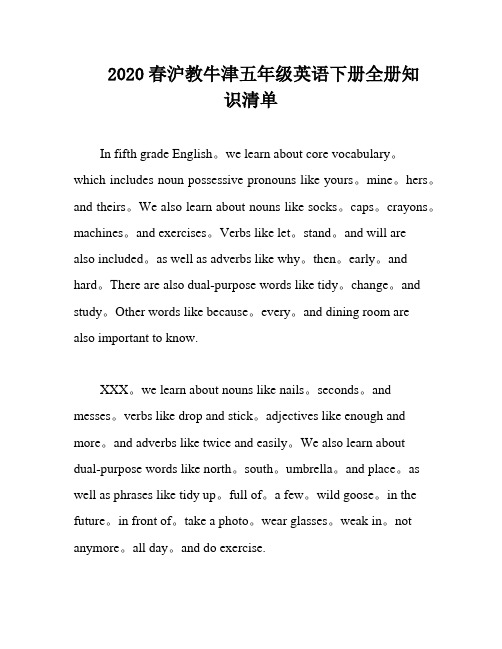
2020春沪教牛津五年级英语下册全册知识清单In fifth grade English。
we learn about core vocabulary。
which includes noun possessive pronouns like yours。
mine。
hers。
and theirs。
We also learn about nouns like socks。
caps。
crayons。
machines。
and exercises。
Verbs like let。
stand。
and will arealso included。
as well as adverbs like why。
then。
early。
and hard。
There are also dual-purpose words like tidy。
change。
and study。
Other words like because。
every。
and dining room are also important to know.XXX。
we learn about nouns like nails。
seconds。
and messes。
verbs like drop and stick。
adjectives like enough and more。
and adverbs like twice and easily。
We also learn aboutdual-purpose words like north。
south。
umbrella。
and place。
as well as phrases like tidy up。
full of。
a few。
wild goose。
in the future。
in front of。
take a photo。
wear glasses。
weak in。
not anymore。
all day。
and do exercise.XXX。
沪教牛津版五年级英语下册全册知识点汇总清单
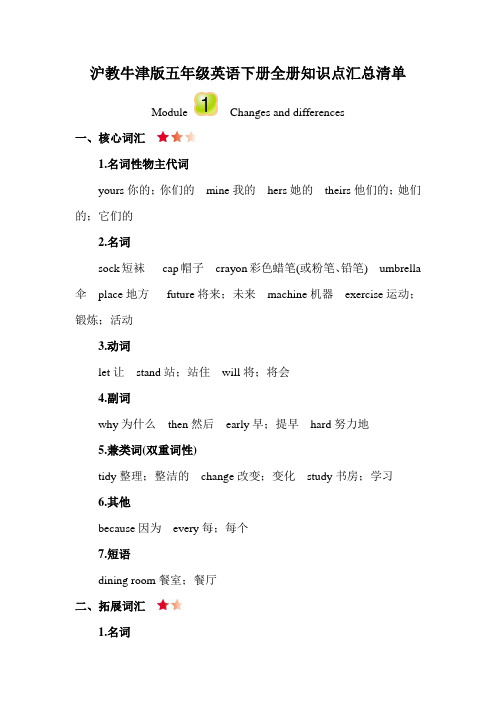
沪教牛津版五年级英语下册全册知识点汇总清单Module Changes and differences一、核心词汇1.名词性物主代词yours你的;你们的mine我的hers她的theirs他们的;她们的;它们的2.名词sock短袜cap帽子crayon彩色蜡笔(或粉笔、铅笔)umbrella 伞place地方future将来;未来machine机器exercise运动;锻炼;活动3.动词let让stand站;站住will将;将会4.副词why为什么then然后early早;提早hard努力地5.兼类词(双重词性)tidy整理;整洁的change改变;变化study书房;学习6.其他because因为every每;每个7.短语dining room餐室;餐厅二、拓展词汇1.名词nail钉子second秒(时间单位)mess脏乱;不整洁2.动词drop使落下;掉落stick粘贴;粘住3.形容词enough足够的more更多的4.副词twice两次easily容易地5.兼类词(双重词性)north北方;向北south南方;向南6.短语tidy up把……整理好(be) full of装满……;充满…… a few几个;一些wild goose大雁(复数wild geese) in the future将来in front of在……前面take a photo拍照wear glasses戴眼镜(be)weak in不擅长not …any more不再all day一天到晚do exercise做运动三、核心句型1.—Are they yours?它们是你的?—No,they aren’t. 不,它们不是。
解读: 问句是一个一般疑问句,用来询问某物的归属,有肯定和否定两种回答。
举一反三: —Are these crayons yours?这些蜡笔是你的吗?—No,they aren’t. 不,它们不是。
上海牛津全国版五年级下册unit 3in the future
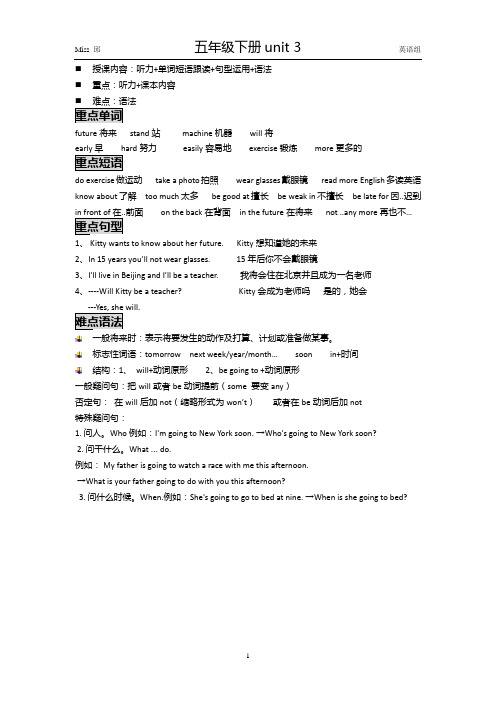
⏹授课内容:听力+单词短语跟读+句型运用+语法⏹重点:听力+课本内容⏹难点:语法重点单词future将来stand站machine机器will将early早hard努力easily容易地exercise锻炼more更多的重点短语do exercise做运动take a photo拍照wear glasses戴眼镜read more English多读英语know about了解too much太多be good at擅长be weak in不擅长be late for因..迟到in front of在..前面on the back在背面in the future在将来not ..any more再也不…重点句型1、Kitty wants to know about her future. Kitty想知道她的未来2、In 15 years you’ll not wear glasses. 15年后你不会戴眼镜3、I’ll live in Beijing and I’ll be a teacher. 我将会住在北京并且成为一名老师4、----Will Kitty be a teacher? Kitty会成为老师吗是的,她会---Yes, she will.难点语法一般将来时:表示将要发生的动作及打算、计划或准备做某事。
标志性词语:tomorrow next week/year/month…soon in+时间结构:1、will+动词原形2、be going to +动词原形一般疑问句:把will或者be动词提前(some 要变any)否定句:在will后加not(缩略形式为won’t)或者在be动词后加not特殊疑问句:1. 问人。
Who 例如:I'm going to New York soon. →Who's going to New York soon?2. 问干什么。
What … do.例如: My father is going to watch a race with me this afternoon.→What is your father going to do with you this afternoon?3. 问什么时候。
新牛津沪教版五下Unit 3知识点汇总

Unit 3In the future词汇1.future(将来;未来)2.stand(站;站住)3.machine(机器)4.will(将;将会)5.exercise(运动;锻炼;活动)6.early(早;提早)7.hard(努力地)知识点1.will的用法I'll live in Beijing and I'll be a teacher.我将住在北京并且我将成为一名老师。
I won't wear glasses.我将不戴眼镜。
2.will构成的一般疑问句Will Kitty be a teacher?凯蒂将成为一名教师吗?3.询问某人将要做什么的句型及其答语What will Peter/Alice do?彼得/爱丽丝将做什么?4.询问某人将要住在哪里的句型及其答语Where will he/she live?他/她将住在哪里?5.字母组合ee,ea,eer与ear在单词中的发音单词:短语:play football踢足球play basketball打篮球play volleyball打排球play the violin拉小提琴play the guitar弹吉他from…to…从……到……table tennis乒乓球运动句型:1.询问某人在某天有什么课程的句型及答语:—What lessons do/does+主语+have+某天?—主语+have/has+学科(PE,Art, Music……)例句:—What lessons do we have today? 今天我们有什么课程?—We have Chinese, Maths, English and Science in the morning.我们上午有语文课,英语课,数学课和科学课。
2.询问别人是否喜欢某项运动或者某种事物的句型及答语:—Does+主语(第三人称单数)+like+某项运动/某物?—Yes, he/she does./No, he/she doesn’t.例句:—Does Alice like playing football?爱丽丝喜欢踢足球吗?—Yes, she does. 是的,她喜欢。
(完整版)牛津英语五年级下册知识点整理,推荐文档
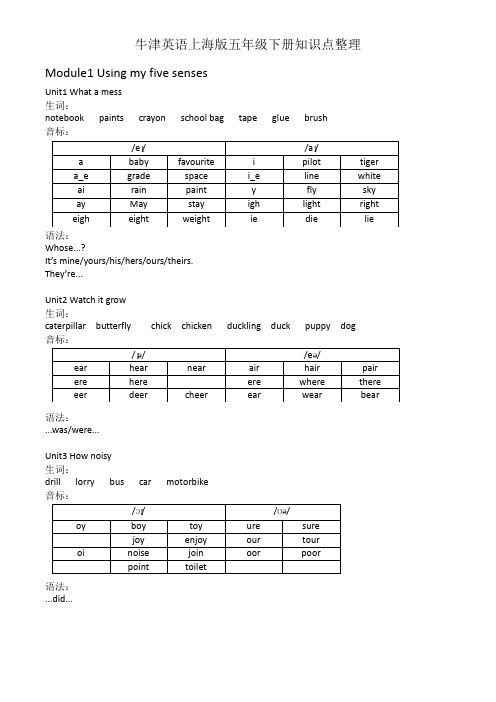
Module1 Using my five sensesUnit1 What a mess生词:notebook paints crayon school bag tape glue brush音标:语法:Whose...?It’s mine/yours/his/hers/ours/theirs.They’re...Unit2 Watch it grow生词:caterpillar butterfly chick chicken duckling duck puppy dog 音标:语法:...was/were...Unit3 How noisy生词:drill lorry bus car motorbike音标:语法:...did...Module2 My favorite thingsUnit1 Food and drinks生词:Meat: pork beef chicken fishVegetables: tomatoes potatoes carrots cabbages beans Fruit: apples oranges bananas grapesStaple Food: rice noodles breadDrinks: juice water milk tea音标:语法:What did you have for...?I had...Unit2 Film生词:ticket ticket office entrance exit seat音标:Shall we...Unit3 school subject生词:Chinese English Maths Art Music IT PE音标:It’s time for...Module3 Things around usUnit1 Signs生词:telephone toilet restaurant exit entranceNo smoking No swimming Don’t litter Don’t walk on the grass 音标:语法:What does this sign say/mean?It says/means we can/can’t/mustn’t/shouldn’t..Unit2 Weather生词:Cloud/cloudy sun/sunny rain/rainy wind/windysnow/snowy storm/stormy fog/foggy 30℃/thirty degrees音标:语法:What’s the weather like? What’s the temperature?It’s...(weather).It’s...(temperature).Unit3 Changes生词:Cupboard bookshelf bed mirror lamp cushion sofa 音标:语法:What can we do?Module4 More things to learnUnit1 Museum生词:Science museum art museum history museum Insect museum car museum railway museum 语法:Which museum do you want to visit?I want to visit ...Why?Because...Unit2 Western holiday生词:Christmas Easter Halloween Thanksgiving 语法:When is ...?It’s on ...What do people do on this holiday?Unit3 story time生词:giant castle。
沪教牛津版五年级英语下册各单元知识清单
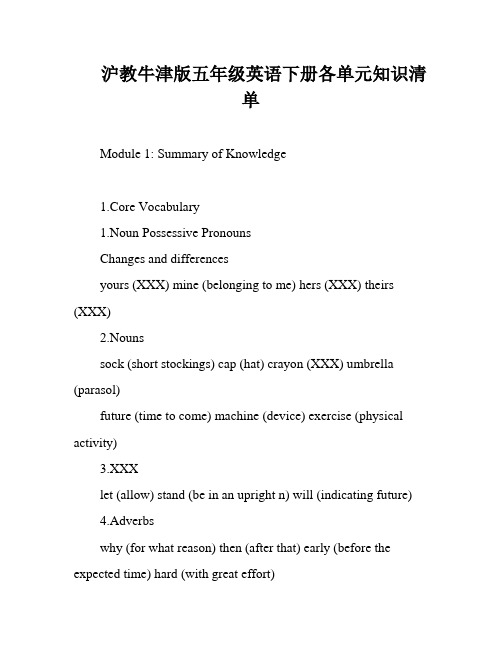
沪教牛津版五年级英语下册各单元知识清单Module 1: Summary of Knowledge1.Core Vocabulary1.Noun Possessive PronounsChanges and differencesyours (XXX) mine (belonging to me) hers (XXX) theirs (XXX)2.Nounssock (short stockings) cap (hat) crayon (XXX) umbrella (parasol)future (time to come) machine (device) exercise (physical activity)3.XXXlet (allow) stand (be in an upright n) will (indicating future)4.Adverbswhy (for what reason) then (after that) early (before the expected time) hard (with great effort)5.n Wordstidy (neat and organized) change (make or e different) study (room for learning)6.XXXbecause (for the reason that) every (each and all)7.Phrasesdining room (room for eating)2.XXX1.Nounsnail (metal pin) second (unit of time) mess (disorder)2.XXXdrop (let fall) stick (attach)3.Adjectivesenough (sufficient) more (a greater amount)4.Adverbstwice (two times) easily (with ease)5.n WordsXXX) XXX)6.Phrasestidy up (organize) be full of (filled with) a few (several) wild goose (plural: wild geese) in the future (time to come) in front of (before) take a photo (photograph) wear glasses (use eyeglasses) weak in (not skilled in) not。
沪教版五年级下册英语Unit3 In the future
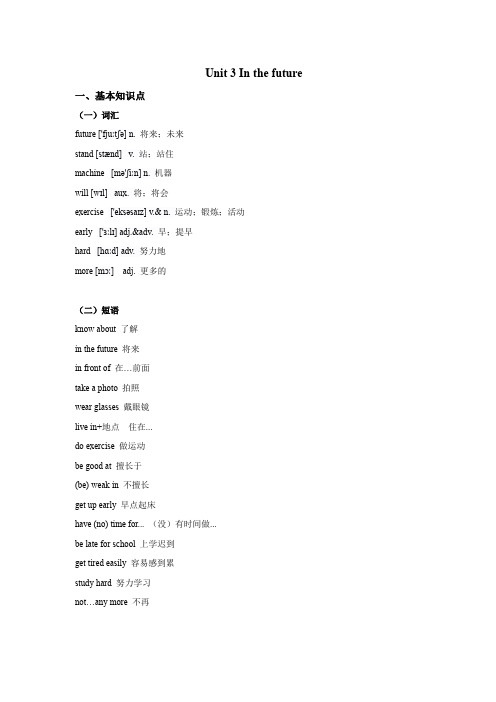
Unit 3 In the future 一、基本知识点(一)词汇future ['fjuːtʃə]n. 将来;未来stand [stænd]v. 站;站住machine [mə'ʃiːn]n. 机器will [wɪl]aux. 将;将会exercise ['eksəsaɪz]v.& n. 运动;锻炼;活动early ['ɜːlɪ] adj.&adv. 早;提早hard [hɑːd] adv. 努力地more[mɔː] adj. 更多的(二)短语know about 了解in the future 将来in front of 在…前面take a photo 拍照wear glasses 戴眼镜live in+地点住在...do exercise 做运动be good at 擅长于(be) weak in 不擅长get up early 早点起床have (no) time for... (没)有时间做...be late for school 上学迟到get tired easily 容易感到累study hard 努力学习not…any more 不再(三)句型1.I’ll be a teacher2.I won’t wear glasses.3.—Will she have beautiful eyes?—Yes, she will./ No, she won’t.4.What will Peter do?/Where will he live?(四)重难点、易错点1.一般将来时:表示将要发生的动作或存在的状态,与表示将来的时间状语连用。
本单元主要学习will+动词原形结构。
2.一般将来时的句型转换及回答3.一般现在时与一般将来时区别:注意动词形式4.写作:描述现在与将来的变化二、典型例题1. Danny will________ a driver in the future.A.isB. amC. be2.—Will your sister wear glasses?—________.A.Yes, she will be.B. No, she won’t.C. Yes, she won’t.3.In ten years, I ________ be a bus driver. I like driving buses.A.willB. amC. want4. I ________(will not) swim in the sea in winter.5. — ________will you be ________ in the________?— I will be tall and cool.三、变式习题基础题(一)词汇将来in front of拍照wear glasses站;站住machine不再做运动be good at不擅长(二)补全单词并翻译汉语tom__ __ row ( )mac__i __ e( )exe__ __i __e( )e__ __ly( )ha__ __( )s__ a__d ( )提高题(一)单项选择( ) 1. I like English very much. I’m ________ it.A. good atB. weak inC. weak at ( ) 2. Don’t watch _______TV. It’s bad for your eyes.A. too manyB. too muchC. a little ( ) 3. Hurry up! We will have no time ________ breakfast.A.forB. withC.eat ( ) 4. Ben doesn’t like sports and he gets tired ________.A. easyB. earlyC.easily ( ) 5. —Where is Mr Fang?—She is ________the blackboard.A. in front ofB. behindC. at the top of(二)问答句配对()1. What will Alice be in the future? A. I will be a good teacher.()2.What will you be like in fifteen years? B. I will have beautiful eyes.()3. Will I wear glasses in fifteen years? C. No, you won’t.()4. Where will I live in the future? D.She will be a singer.()5. Will you be a teacher or a singer? E. You will live in London.强化题(一)按要求改写句子1.I will live in Beijing in the future. (改成否定句)______________________________________________________________2.Peter is good at Maths and English.(对划线部分提问)_______________________________________________________________3.I don’t have time for breakfast . (改为同义句)_______________________________________________________________4.My father will live in Shanghai.. (对划线部分提问)_______________________________________________________________5.in, stands ,of, a , magic, front, machine, She.(连词成句)_______________________________________________________________(二)阅读短文,判断句子正误,填入T(正确)或F(错误)Dan is a little boy. One day, he is sitting in a tree in his garden. Then a man walks by. He stops and says, “Don’t sit in the tree. You will fall down .” Dan doesn’t listen to him. He thinks, “I’m so clever. I won’t listen to him and I will never fall down. ” He sits on the branch(树枝). He tries to cut the branch. After a few minutes, he falls down. “Wow! That man knows the future! ” Dan cries.()1. Dan is at school.()2. Dan is sitting under the tree.()3. Dan doesn’t listen to the man.()4. The man knows about Dan’s future.()5. Dan is a clever boy.(三)写作以“My future”为题,写一篇小短文,不少于30个词。
牛津沪教版小学英语五年级下册知识点总结.doc

牛津沪教版小学英语五年级下册知识点总结.doc牛津沪教版小学英语五年级下册知识点总结沪教版五年级英语下册(上海牛津5B) 知识点总结知识点总结动词的方法:一、动词后边加上 ing :①、现在进行时:表明某个动作正在产生或进行。
它的构成方法是:主语+be+动词ing 〔现在分词〕形式,有时会要求自己加上be 动词(is, am , are )。
语句中常常会呈现look, listen,now ??等词。
现在进行时的改变肯定句式:主语+be( am, is, are)+动词ing+ 其它.否定句式:主语+be(am, is, are) + not +动词ing+ 其它.一般疑问句:Be(am, is, are) + 主语+动词ing + 其它?特殊疑问句:疑问词(what , where ?)+be(am, is, are)+ 主语+动词ing + 其它?对现在进行时的特别疑问句的答复,它不可以用Yes 或No 直接作答,要依据实际情况答复。
练习:1. What are you _________(do)now? I ___________(eat) bread.2. It ’s nine o ’clocyk.f.aMther_______________(work) in the office.3. Look, the boy____________(put) the plate on his finger.4. __________he__________(clean) the classroom? No, heisn ’t.He____________(play).5. Where is Mak? He___________(run) on the grass.6. Listen, who___________(sing) in the music room? Oh,Mary___________(sing)there.②like(s), go ,do some , 后面的动词加ing.如:1. I like (play ) football, but my father likes (play) chess.2.Let ’s go (swim).二、动词后边加 s/es.这就有关一种时态:一般现在时。
沪教版 牛津英语五年级英语下册 Module3 Unit2

There was a hissing noise. The spaceship flew into the sky.
was----is flew------fly
一般过去时
表示过去某一时间发生的动作或存在的 状态,与表示过去的时间连用,用动词的 过去式,表示此动作发生在过去。
动词原形变动词过去式的规则
Diary June 2
Saturday
1.I got up at seven oclock. I brushed my teeth and washed my face. I ate my breakfast. 2.I played football in the morning.I scored two goals.
3.I went home at one o’clock. We went to a restaurant for lunch.The restaurant was noisy!
4.I went to the park in the afternoon.There was a pop group.The music was very loud. It was super!
small
Now there was a huming noisee-hmmm. John and Mary were afraid.
A little,green man looked at John and Mary.He was afraid. He jumped into the spaceship.
Do you like loud music,Ben? Yes,I do.
Ben and Kitty were at home.
Boom!Boom! I don’t like your Boom!Boom! Kitty played some Loud music. loud music.Ben did not like Kitty’s loud music.
- 1、下载文档前请自行甄别文档内容的完整性,平台不提供额外的编辑、内容补充、找答案等附加服务。
- 2、"仅部分预览"的文档,不可在线预览部分如存在完整性等问题,可反馈申请退款(可完整预览的文档不适用该条件!)。
- 3、如文档侵犯您的权益,请联系客服反馈,我们会尽快为您处理(人工客服工作时间:9:00-18:30)。
Module Things we do
一、核心词汇
1.名词
hall礼堂trousers裤子sweater毛衣coat外套;大衣shoe鞋smile笑容;微笑money钱laugh大笑headache头痛fever发烧;发热medicine药rest 休息toothache牙痛present礼物world世界
2.动词
meet迎接;会见show给……看keep保持should应该
3.形容词
ill生病的;不舒服wrong有毛病;不正常;错误的
4.副词
finally最后which哪一个;哪一些only只有;仅
5.短语
school gate校门;校门口art room美术室meeting room会客室;会议室
二、拓展词汇
1.名词
project课题board布告牌;木板size尺码emperor皇帝dentist牙医
2.动词
nod点头
3.形容词
toothless没有牙齿的
4.短语
try … on试穿(衣物)put on穿;戴keep quiet保持安静have a look看一看
have a headache头疼have a fever发烧have a cold感冒have a rest休息一下get well康复have a toothache牙疼have a meeting开会pull… out把……拔出
三、核心句型
1.First, they’ll visit our classroom. 首先,他们将参观我们的教室。
解读: 这是一个一般将来时的句型, first意思是“首先”,常用于叙述事情发展的开端。
visit意思是“参观”。
举一反三: First, I clean the living room. Then I clean my bedroom. 首先,我打扫
客厅。
然后我打扫我的卧室。
First, you should finish your homework. Next, you should wash your clothes. Then you can go out to play. 首先你应该完成你的家庭作业。
紧接着,
你应该洗你的衣服。
然后你可以出去玩儿。
2.Which dress do you like, the blue one or the pink one?你喜欢哪件连衣裙,蓝色
的那件还是粉色的那件?
解读: 这是一个选择疑问句; which是特殊疑问词,后面跟名词, or意思是
“或者”,答句一般选择其一作答。
举一反三: Which cap do you like, the blue one or the brown one?你喜欢哪顶帽子,蓝色的还是棕色的?
Which teacher do you like, Miss Li or Mr Lu?你喜欢哪位老师,李老师还是陆老师?
3.You should take some medicine. 你应该吃些药。
解读: 这是一个含有情态动词should的陈述句, should意思是“应该”,是情
态动词,后面跟动词原形,没有人称和数的变化。
take本意是“带走;拿走”,在
此处意思是“吃”; medicine是不可数名词。
举一反三: We should keep quiet in the classroom. 我们在教室里应该保持安静。
They should come here early. 他们应该早点儿来这里。
4.You shouldn’t go to bed late. 你不应该很晚上床睡觉。
解读: 这是一个否定句, shouldn’t是should not 的缩略形式,意思是“不应该”,后面跟动词原形。
go to bed是固定短语,意思是“上床睡觉”, late是副词,修饰
动词作状语。
举一反三: You shouldn’t go out to play. It’s cold outside. 你不应该去外面玩。
外面很冷。
You shouldn’t go to school by bike. Because there are lots of cars and buses on the road. It’s very dangerous. 你不应该骑自行车去上学。
因为在公路上有很
多的汽车和公共汽车。
那样很危险。
5.What’s wrong with you?你哪里不舒服?
解读: 这是一个特殊疑问句。
what是特殊疑问词, wrong意思是“有毛病;不
正常;错误的”,with是介词,意思是“和……在一起”,后边跟人称代词宾格形
式或某个人。
举一反三: — What’s wrong with Tom? 汤姆哪里不舒服?
— He has a cold. 他感冒了。
— What’s wrong with Jack? 杰克哪里不舒服?
— He falls down. He hurts his leg. He feels sad. 他跌倒了。
他摔伤了腿。
他很难过。
四、拓展句型
1.That’s right. 正确。
解读: 这是一个简单的肯定句。
常用于对他人说的话表示肯定。
2.After that, they’ll go to the library. 之后,他们将去图书馆。
解读: 这是一个接上文继续陈述某件事情的发展经过的句型, that代指上文提到
的事情, after that是指“(在那件事情)之后”,此句是一般将来时态的句子, will
加动词原形,表示将要做某事,没有人称和数的变化。
3.You can try both on. 你可以试穿这两件。
解读: 这是一个陈述句。
情态动词can加动词原形,一起构成谓语, both意思是“两者都”, try … on是固定短语,意思是“试穿(衣物)”。
4.Here you are. 给你。
解读: 这是一个不完全倒装句。
以here, there开头的句子,如果主语是名词,其谓语动词要放到主语之前,即: Here/There + 谓语动词 + 主语(名词)。
5.I like the brown one. 我喜欢棕色的那件。
解读: 这是一个陈述句, one在这里是代指上文提到过的某人或某物。
如果上文提到的是复数,则用ones来代指。
6.Which pair of trousers does Ben like? 本喜欢哪条裤子?
解读: 这是一个特殊疑问句, which后面跟名词。
pair是“成双成对”的意思,a pair of意思是“一双/条/副……”。
如: a pair of socks一双袜子 a pair of gloves一副手套。
7.There is an emperor. 有一个皇帝。
解读: 这是there be结构的句型,系动词be遵循就近原则。
如果主语是单数,则用there is,如果主语是复数,则用there are。
an表示一个,用在以元音音素开头的名词前面。
如: an egg一个鸡蛋 an apple一个苹果。
